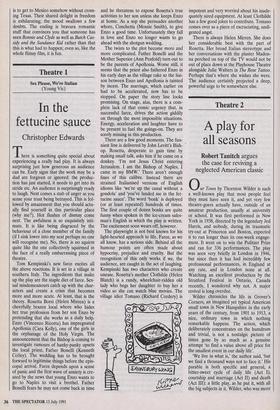Theatre 1
Sex Please, We're Italian (Young Vic)
In the fettucine sauce
Christopher Edwards
There is something quite special about experiencing a really bad play. It is always surprising just how generous an audience can be. Early signs that the work may be a dud are forgiven or ignored: the produc- tion has just started, it needs to get into its stride etc. An audience is surprisingly ready to laugh. Next comes a stab of anger as you sense your trust being betrayed. This is fol- lowed by amazement that you should actu- ally find yourself in this particular place (why me?). Hot flushes of dismay come next. The awfulness is so exquisitely inti- mate. It is like being disgraced by the behaviour of a close member of the family (if I sink lower into my seat perhaps no one will recognise me). No, there is no squirm quite like the one collectively squirmed in the face of a really embarrassing piece of theatre.
Tom Kempinski's new farce excites all the above reactions. It is set in a village in southern Italy. The ingredients that make up the play are the staple diet of farce. Sex- ual misdemeanours catch up with the char- acters and create a crisis that becomes more and more acute. At least, that is the theory. Rosetta Borsi (Helen Mirren) is a cheerfully brazen local whore who hides her true profession from her son Enzo by pretending that she works as a daily help. Enzo (Vincenzo Ricotta) has impregnated Apollonia (Cara Kelly), one of the girls in the orphanage of the Holy Virgin. The announcement that the Bishop is coming to investigate rumours of hanky-panky upsets the local priest, Father Bonelli (Kenneth Colley). The wedding has to be brought forward to legitimise things before the epis- copal arrival. Farce depends upon a sense of panic and the first wave of anxiety is cre- ated by the news that young Enzo wants to go to Naples to visit a brothel. Father Bonelli fears he may not come back in time and he threatens to expose Rosetta's true activities to her son unless she keeps Enzo at home. As a sop she persuades another whore, Conchetta (Mossie Smith), to give Enzo a good time. Unfortunately they fall in love and Enzo no longer wants to go ahead with the shotgun wedding.
The twists to the plot become more and more complicated. Father Bonelli and the Mother Superior (Ann Penfold) turn out to be the parents of Apollonia. Worse still, it seems that the priest also fathered Enzo in his early days as the village rake so the liai- son between Enzo and Apollonia is tainted by incest. The marriage, which earlier on had to be accelerated, now has to be stopped. On paper the story line looks promising. On stage, alas, there is a com- plete lack of that comic urgency that, in successful farce, drives the action giddily on through the most impossible situations. Energy, acceleration and laughter have to be present to fuel the goings-on. They are sorely missing in this production.
There are a few good moments. The fun- niest line is delivered by John Levitt's Bish- op. Rosetta, desperate to gain time by making small talk, asks him if he came on a donkey. `I'm not Jesus Christ entering Jerusalem. I am the Bishop of Naples. I came in my BMW.' There aren't enough lines of this calibre. Instead there are strained Italianised versions of English idioms like `we're up the canal without a gondola' and `you've landed me in the fet- tucine sauce'. The word `honk' is deployed (or at least repeated) hundreds of times. The first couple of dozen bonks are quite funny when spoken in the ice-cream sales- man's English in which the play is written. The excitement soon wears off, however.
The playwright is not best known for his light-hearted approach to life. Farce, as we all know, has a serious side. Behind all the humour points are often made about hypocrisy, prejudice and cruelty. But the recognition of this only works if we, the audience, are caught in the act of laughing. Kempinski has two characters who create unease. Rosetta's mother Clothilde (Helen Blatch) is a randy, wheelchair-ridden old lady who begs her daughter to buy her a video so she can watch blue movies. The village idiot Tomaso (Richard Cordery) is impotent and very worried about his inade- quately sized equipment. At least Clothilde has a few good jokes to contribute. Tomaso comes over as a piece of excruciating, undi- gested angst.
There is always Helen Mirren. She does her considerable best with the part of Rosetta. Her broad Italian stereotype and her conversations with the plaster Madon- na perched on top of the TV would not be out of place down at the Playhouse Theatre alongside Julie Walters in The Rose Tattoo. Perhaps that's where she wishes she were. The audience certainly projected a deep, powerful urge to be somewhere else.


















































 Previous page
Previous page